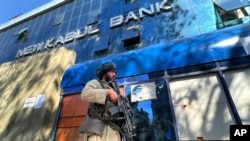De facto authorities in Afghanistan have called on the United States to reconsider a plan to transfer billions of Afghan financial assets to a Swiss bank and disburse them outside the country’s central bank.
The released funds will be used to stabilize the hobbled Afghan economy and mitigate the country's ongoing humanitarian crisis, but the Taliban will have no role in the process.
“The Afghan Fund will protect, preserve, and make targeted disbursements of that $3.5 billion to help provide greater stability to the Afghan economy. The Taliban are not a part of the Afghan Fund, and robust safeguards have been put in place to prevent the funds from being used for illicit activity,” the U.S. Treasury and State Department said in a joint statement on Tuesday.
The U.S. froze $7 billion of Afghanistan’s financial reserves in New York immediately after the Taliban seized power last year. About $2 billion in additional Afghan funds are held in several other countries.
In February, President Joe Biden authorized the release of half of the frozen reserves and left the rest for 9/11 victims to pursue through ongoing litigation.
The Taliban have long demanded the U.S. to release the funds, arguing they belong to Afghanistan.
“Da Afghanistan Bank rejects the allocation, use and transfer of these reserves for unorganized shares and demands a reconsideration in this regard,” reads a statement the central bank of Afghanistan issued in response to the U.S. announcement.
The Taliban did not comply with requirements for the funds to be released to the Afghanistan central bank, U.S. officials said. Under such conditions, the central bank would be immune from political interference, deliver anti-money laundering and anti-terrorism financing guarantees, and accept robust monitoring from independent external auditors.
Bypassing the Taliban
After they are transferred from the Federal Reserve in New York to an account at the Bank for International Settlements in Switzerland, the Afghan funds will be managed by a four-member board comprising two former Afghan officials, one U.S. official, and one Swiss.
The funds will not be used to purchase humanitarian supplies, Thomas West, U.S. special representative for Afghanistan, said on Wednesday, adding that small amounts from the funds will be used to pay Afghan arrears to international financial institutions such as the World Bank for Afghanistan to remain eligible for international aid.
The funds could also pay for electricity imports to Afghanistan from its immediate neighboring countries.
“In the short-term, the Board of Trustees of the Afghan Fund will have the ability to authorize targeted disbursements to promote monetary and macroeconomic stability and benefit the Afghan people,” said the U.S. statement.
Stabilizing the Afghan economy and reaching out to assist millions of Afghans without any Taliban involvement will be extremely difficult, if not impossible, experts say.
“Any aid that gets through could be helpful, but the economy will not be able to recover from the depression that it is in right now without a functioning Central Bank, and [that] requires that the Central Bank have possession of its reserves,” Mark Weisbrot, co-director of the Center for Economic and Policy Research, told VOA.
International actors “will need Taliban’s consent, whatever they want to do” in Afghanistan, said Khan Afzal Hadawal, a former governor of Da Afghanistan Bank. Nongovernmental organizations will need to work with Taliban authorities to effectively implement development and humanitarian projects, he told VOA.
While the Taliban have allowed foreign aid agencies to operate in Afghanistan, the U.N. has recently voiced concerns about growing problems and obstacles that female humanitarian workers face under the Taliban.
“Amid a growing set of restrictions curtailing their basic rights and freedoms, female humanitarian workers face harassment, intimidation and mistreatment on a daily basis — from the moment they leave their homes, to the point they return,” the U.N. Office for the Coordination of Humanitarian Affairs said in a statement Wednesday.
Not a panacea
Already one of the poorest countries on earth, Afghanistan has sunk deeper in poverty and humanitarian challenges over the past year.
The U.N. has called for more than $4.4 billion in aid to prevent a widespread humanitarian disaster in the country, but as of Wednesday, donors have funded 43% of the appeal.
“The release of these funds will not address all the economic woes in the country, and more needs to be done to revive the economy,” Khalid Payenda, a former Afghan finance minister, told VOA. “And any scenarios that see the release of these assets as the cure to all issues in the economy are flawed."
Last month, dozens of international economists and academics, including Nobel laureate Joseph Stiglitz, called on Biden to release the Afghan funds to Da Afghanistan Bank, despite it being run by the Taliban.
“Without access to its foreign reserves, the central bank of Afghanistan cannot carry out its normal, essential functions. Without a functioning central bank, the economy of Afghanistan has, predictably, collapsed. The people of Afghanistan have been made to suffer doubly for a government they did not choose. In order to mitigate the humanitarian crisis and set the Afghan economy on a path toward recovery, we urge you to allow DAB [Da Afghanistan Bank] to reclaim its international reserves,” the letter said.
In addition to denying the Taliban Afghanistan’s financial assets, the U.S. has imposed financial and political sanctions on Taliban leaders and institutions, some of which date back to late 1990s, when the Taliban were hosting al-Qaida leaders despite U.S. objections.
Last month, a travel exemption that permitted some Taliban leaders to travel abroad, mostly for negotiations with foreign officials, expired as members of the U.N. Security Council could not agree on an extension.
The Taliban is not recognized as a legitimate government, and its year in power has been widely criticized as repressive and draconian, particularly for Afghan women.




